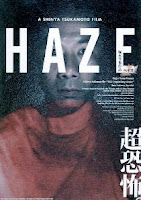 Killer of Sheep (Charles Burnett, 1977)Rating:
Killer of Sheep (Charles Burnett, 1977)Rating: 9.6
Burnett's thesis film at UCLA which is was declared a national treasure by Congress in 1990 is a response to the widely popular blaxploitation films of the era. Burnett's film made on a shoestring budget, using nonprofessionals preaches naturalism and familiarity as opposed to escapism as we see Stan battle depression and insomnia as he works in a slaughterhouse to support his family.
Killer of Sheep captures a portrait of a specific time and place in history like the famous Italian neorealist films that came before it as well as the American underground filmmakers among others who embraced this aesthetic style. In my opinion the African American art films such as this,
The Cool World, and
Nothing But a Man comprise a core group of truly unique and original American neorealist films. The sequences of children playing and fighting in the streets, throwing dirt clods, riding bikes, and building forts are so natural and nostalgic. The fantastic soundtrack consisting of jazz, blues, soul, and popular classics including music from Louis Armstrong, Raul Robeson, Scott Joplin, and Dinah Washington, serves mostly an ironic function as we see in the scene where children play among the rubble of dilapidated buildings and "What is America To Me?" plays on the soundtrack. Sometimes the music functions more literally, as in the scene where Stan and his wife dance to "This Bitter Earth" before Stan declines his wife's sexual advances. The slaughterhouse scenes, where we see sheep herded to their brutal deaths alludes to the lack of control humanity has over our own circumstances. Burnett effectively conveys the everyday comedy and hardships people face, as well as family relationships and their longing for a brighter future in Watts, Los Angeles, California, in the 1970s.
"You're about as tasteless as a carrot."
-"Daddy, what makes it rain?"
-"Why, It's the devil beating his wife."























